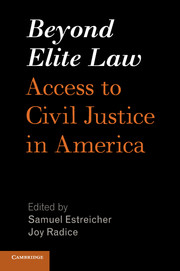Book contents
- Frontmatter
- Contents
- Beyond Elite Law
- Foreword
- List of Contributors
- Overview
- Overview
- PART I CURRENT STATE OF ACCESS TO LEGAL SERVICES
- PART II SOURCES OF LEGAL SERVICES ASSISTANCE FOR WORKING AMERICANS
- PART III FASHIONING A REFORM AGENDA
- 23 New York State Task Force to Expand Access to Civil Legal Services
- 24 New York's 50-hour Pro Bono Requirement
- 25 Starting a “Low Bono” Law Practice
- 26 Toward a More Effective and Accessible Solo and Small Firm Practice Model
- 27 Facilitating Homemade Wills
- 28 Court Facilitation of Self-Representation
- 29 Limited Representation and Ethical Challenges
- 30 Technology Can Solve Much of America's Access to Justice Problem, If We Let It
- 31 Mediation of Employment Disputes at the EEOC
- 32 AAA Consumer Arbitration
- 33 Saturns for Rickshaws: Lessons for Consumer Arbitration and Access to Justice
- 34 Employment Arbitration in the Securities Industry
- 35 FINRA Arbitration and Employment Disputes
- 36 Arbitration as an Employee-Friendly Forum
- 37 Access to Justice in Employment Arbitration: a Critical Look
- 38 Collaborative Technology Improves Access to Justice
- 39 Union Representation in Employment Arbitration
- 40 Legal Representation for New York City's Chinese Immigrant Workers
- 41 Reassessing Unauthorized Practice of Law Rules
- 42 The Pyett Protocol: Collectively-Bargained Grievance Arbitration as a Forum for Individual Statutory Employment Claims
- PART IV CREATING A CULTURE OF SERVICE
- Index
30 - Technology Can Solve Much of America's Access to Justice Problem, If We Let It
from PART III - FASHIONING A REFORM AGENDA
Published online by Cambridge University Press: 05 May 2016
- Frontmatter
- Contents
- Beyond Elite Law
- Foreword
- List of Contributors
- Overview
- Overview
- PART I CURRENT STATE OF ACCESS TO LEGAL SERVICES
- PART II SOURCES OF LEGAL SERVICES ASSISTANCE FOR WORKING AMERICANS
- PART III FASHIONING A REFORM AGENDA
- 23 New York State Task Force to Expand Access to Civil Legal Services
- 24 New York's 50-hour Pro Bono Requirement
- 25 Starting a “Low Bono” Law Practice
- 26 Toward a More Effective and Accessible Solo and Small Firm Practice Model
- 27 Facilitating Homemade Wills
- 28 Court Facilitation of Self-Representation
- 29 Limited Representation and Ethical Challenges
- 30 Technology Can Solve Much of America's Access to Justice Problem, If We Let It
- 31 Mediation of Employment Disputes at the EEOC
- 32 AAA Consumer Arbitration
- 33 Saturns for Rickshaws: Lessons for Consumer Arbitration and Access to Justice
- 34 Employment Arbitration in the Securities Industry
- 35 FINRA Arbitration and Employment Disputes
- 36 Arbitration as an Employee-Friendly Forum
- 37 Access to Justice in Employment Arbitration: a Critical Look
- 38 Collaborative Technology Improves Access to Justice
- 39 Union Representation in Employment Arbitration
- 40 Legal Representation for New York City's Chinese Immigrant Workers
- 41 Reassessing Unauthorized Practice of Law Rules
- 42 The Pyett Protocol: Collectively-Bargained Grievance Arbitration as a Forum for Individual Statutory Employment Claims
- PART IV CREATING A CULTURE OF SERVICE
- Index
Summary
Can the increasing number of online self-help resources created by private companies, the courts, and public agencies help fill the access to justice gap? Benjamin Barton argues that they can. Barton describes the availability of free online forms on state court websites, low-cost document assembly services, like LegalZoom, and legal advice resources. For routine legal problems, online legal solutions are especially promising.
This chapter argues that technology is likely to be the best bet for solving these problems. We are at the very beginning of the application of computer power to legal services and we have already seen much that will help increase access to justice: free or low-cost access to the law itself (statutes, regulations, and cases), free or low-cost legal forms, low-cost access to legal advice, etc. Moreover, as computer technology becomes even more sophisticated and we move into more advanced stages of computerization, we may see technology fundamentally reshape the market for legal services.
Two caveats. First, for potential clients who are illiterate or lack access to a computer with internet access, computerization is unlikely to be of much help. Access to the internet is continuing to grow, however. Approximately 70% of Americans have a broadband connection at home, including more than half of households with incomes below $30,000. Almost all public libraries provide free access to the internet and computers as well. Chicago-Kent Law School's A2J project is also beginning to make smartphone versions of their internet access to justice programs, and 61% of Americans own a smartphone. Despite the possibility of access, however, there are significant numbers of Americans incapable of self-help, regardless of technological advances. It is worth noting, however, that if technology can reach some of the low-hanging fruits of need, legal aid and pro bono efforts could focus more narrowly on the neediest Americans.
Second, technology will not reach all of American legal needs equally. There are at least four different types of legal work the poor and middle class need, and some is more likely to be provided inexpensively by computers than others. The easiest case is access to the raw materials of American law.
- Type
- Chapter
- Information
- Beyond Elite LawAccess to Civil Justice in America, pp. 444 - 462Publisher: Cambridge University PressPrint publication year: 2016



